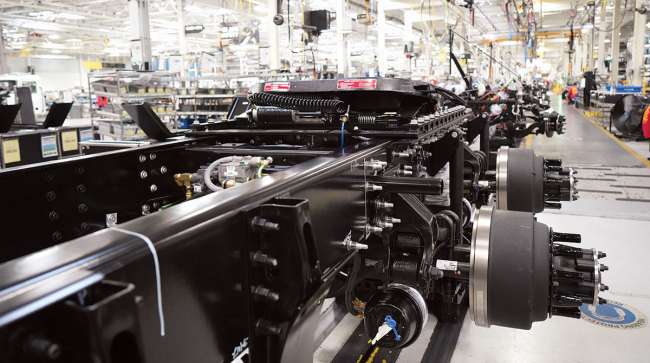Staff Reporter
Volvo Q1 Earnings Jump as Sales Soar

[Stay on top of transportation news: Get TTNews in your inbox.]
Truck manufacturer Volvo Group posted net income of $1.25 billion, or 62 cents per share, in the three months that ended March 31, compared with $685 million, 29 cents, in the year-ago period, as sales across all its business lines soared, the company said April 20.
The company reports in Swedish krona.
The Gothenburg, Sweden-based parent of Volvo Trucks North America — one of the largest Class 8 truck makers in the United States — posted global revenue in the first quarter of $12.74 billion, an all-time high and year-over-year increase of 25% from $10.21 billion, it said.
Trucks accounted for $8.68 billion of that first-quarter sales total, a 29% year-over-year increase, the company said. North American sales totaled $2.68 billion compared with $1.995 billion a year earlier, it added.
Volvo Group said its adjusted operating margin on trucks in the most recent three-month period was 14.2%, also an all-time high, compared with 12.5% in the first quarter of 2022. For all of 2022, the margin was 10.9%, it added.

Lundstedt
“Despite a deteriorating economic outlook with high inflation and rising interest rates, transport volumes and infrastructure activity have continued to be solid in most of our markets,” Martin Lundstedt, Volvo Group CEO, said in a statement April 20 accompanying the earnings. “In combination with customers’ need to renew aging fleets, this contributes to good demand for our products.”
“There is a continued pent-up need to replace aging fleets, which is noticeable on the truck side, where order intake rose as we gradually opened the order books for the second half of 2023,” Lundstedt added.
Volvo Group’s order intake in the first three months of 2023 increased 32% to 60,040 trucks while deliveries increased 11% to 61,531 trucks. Its truck order intake in North America increased 152% year-over-year to 15,159 while deliveries increased by 15% to 16,011 trucks.
Of that order intake total, 7,555 were Mack Trucks, compared with 1,732 in the period a year earlier, a 336% jump, the parent company said.
Mack won 7,933 new orders worldwide in the first quarter, compared with 2,031 a year earlier. Of Mack’s overall total in the first quarter, 6,268 were larger than 16 tons, compared with 1,816 a year earlier, Volvo said.
VTNA’s heavy-duty truck market share through March decreased to 8.7% from 9.8% a year earlier. Mack’s market share increased to 5.7% from 5.3% in the year-ago period.
When it came to electric trucks, the company’s first-quarter order intake increased by 67% year-over-year to 825 vehicles while deliveries increased by 254% to 683 vehicles. Of those orders, 486 were Volvo-branded vehicles, while 15 were Mack trucks. A year earlier, Mack’s share was zero. Mack delivered two electric trucks in the most recent quarter.
Demand for EVs, including battery-electric trucks, “continues to increase rapidly,” Lundstedt said during an analyst call following the release of the earnings.
Lundstedt said working ever closer with customers of Volvo Trucks had paid off, driving growth, and more of the same would be needed when it came to battery-electric trucks. However, price increases would be coming due to what acting Chief Financial Officer Jan Ytterberg later in the call termed the “green transformation.”
Ytterberg added that the company hopes its operating margins can improve further, even with some challenges. That said, he noted, cost pressures will continue, including from wages — particularly in Sweden.
Further headwinds can be expected from supply chain difficulties, the executives said, particularly in North America.
The company’s North American operations were seeing a higher level of difficulties than their European counterparts, its CEO said, adding that this would continue in the second quarter of 2023. Volvo would “take a little bit of time to get through this,” he noted.
Q1: Strong start to 2023: https://t.co/jPILzbdEgk #volvogroupreport #fintwit #financialreport #quarterlyreport #q1 #volvo pic.twitter.com/4q3Y5z7hpH — Volvo Group (@VolvoGroup) April 20, 2023
Such North American difficulties were due to problems for specific suppliers rather than industrywide shortages, say of drivers or semiconductors, said Lundstedt.
Volvo Group expects a gradual increase in capital expenditures through the end of 2024, said Ytterberg, who has been acting CFO since Tina Hultkvist resigned in February. The company gave no reason for Hultkvist’s departure and continues to search for a permanent replacement.
Want more news? Listen to today's daily briefing below or go here for more info:

